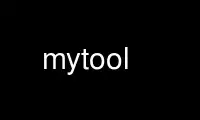
This is the command mytool that can be run in the OnWorks free hosting provider using one of our multiple free online workstations such as Ubuntu Online, Fedora Online, Windows online emulator or MAC OS online emulator
PROGRAM:
NAME
mytool - manipulate map files for yudit, uniconv and uniprint
SYNOPSIS
mytool [ -info ] [ -test ] [ -showkeys ] [ -decode ] [ -encode ] [ -strip ] [ -benchmark ]
[ -name new-name ] [ -comment new-comment ] [ -type new-type ] [ -write output-file ] [
-my input-file ] [ -mys input-file ] [ -rmys input-file ] [ -kmap input-file ] [ -rkmap
input-file ] [ -uni:l,u input-file [ -8 ] [ -high ] [ -low ] [ -runi:l,u input-file [ -8 ]
[ -high ] [ -low ] ] [ -convert out-file-format ]
DESCRIPTION
mytool is a my map file manipulation program in the yudit distribution. It can generates
so-called binary nbit ( my ) map file that can map any sequences of bytes into any
sequences of bytes. These sequences of bytes can be grouped into 1,2,4 and 8 bytes long
words. The input sequence length may be different from the matched sequence length. 'i /
'n -> 'b specifies that the word 'in' produces 'b' but only the 'i is consumed from the
input buffer.
It can also generate a so-called binary umap file, that maps 8 or 16 bit single words into
16 bit single words and it contains the reverse map too.
It can also disassemble the input map and produce a mys source file.
The input can be a binary umap file, a my file, mys file a uni and a kmap file for yudit.
It is recommended that all kmap files use the new mys format because it gives more freedom
to define the mapping.
The yudit distribution has a simple document yudit/doc/my.doc on the binary map formats,
and a source file example file yudit/mytool/my/example.mys please refer to this for more
details.
OPTIONS
-info prints out a small information on the current map.
-test lets you test the map interactively.
-showkeys
show alls the keys in the map file.
-encode
builds a state machine in the encoding part of the map file. The resulting map file
can be written to disk with the -write option The resulting my files can contain
state machines to speed-up conversion. A state machine based my file can manifest
10%-70% performance improvement, so it may be desirable for encoding fontmaps. For
fontmaps the bumap format might be better suited where only one character and not a
sequence of characters need to be mapped.
-decode
builds a state machine in the decoding part of the map file.
-strip strips off the state machines from the map files. The -write option can be used to
save the new map file.
-benchmark
option performs a simple benchmark test on the map file, to compare speed of
simple, state machine based and binary map based map files.
-nocomment
option strips all comments from an input source file of format mys kmap uni. It
does not strip comments from a binary file.
-name new-name
assigns a name to the map file.
-comment new-comment
assigns a comment to the map file.
-type new-type
assigns a map file a distinctive type, that can be kmap or fontmap but it is only
informative. Keymaps can be used as fontmaps and vice versa.
-write output-file
writes the data into an output file. mytool never modifies the original file. All
modifications should be explicitly saved with the this option. Never specify the
same file for input and output.
-my input-file
load a binary map file. Only one of this option can be specified.
-mys input-source-file
load a source file.
-rmys input-source-file
load a source file and reverse it - make encoding from decoding and vice versa.
-kmap input-source-file
load a source file in kmap format.
-rkmap input-source-file
load a source file and reverse it - make encoding from decoding and vice versa.
-uni:l,u input-source-file
load a source file in Unicode Consortium format. This format has the local code in
column l, and unicode in column u. The numbering of columns start from 0.
-runi:l,u input-source-file
load a source file in Unicode Consortium format and reverses it. Make encoding from
decoding and vice versa.
-8 option can be used with the -uni or -runi options. It specifies that the input is 8
bit and not 16 bit.
-high option can be used with the -uni or -runi options. It specifies that the key should
be or'ed with 0x8080.
-low option can be used with the -uni or -runi options. It specifies that the key should
be and'ed with 0x7f7f.
-convert output-file-format
converts the map file to a format. It is useful only when combined with -write
otion. The possible formats are my -binary, mys -source, myc -my-c-source, umap
-umap-c-source, bumap -binary-umap formats. For maps where only a single 8 or 16
bit local code should be converted into 16 bit unicode and vice versa, the umap
file formats are recommended. The c-source files are provided so that you can
inlucde a full map into the c program.
DIAGNOSTICS
mytool prints out an error message and exits with a non-zero status on error. If there
is no error the exit status is zero.
Use mytool online using onworks.net services
